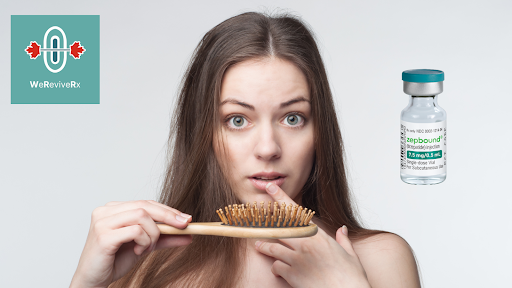Zepbound and Hair Loss: What’s the Link?
Zepbound and Hair Loss: What’s the Link?

Introduction
If you’re taking Zepbound for weight loss and noticing more strands in your brush or shower drain, you’re not alone. While not a direct side effect of the medication, hair shedding can happen during significant weight loss—and it’s understandably concerning.
In this blog, we’ll explain the connection between Zepbound and hair loss, what’s normal, what’s not, and how to protect your hair while shedding pounds.
Does Zepbound Cause Hair Loss?

However, rapid or significant weight loss—especially over a short period—can trigger a condition called telogen effluvium.
This is a temporary form of hair shedding caused by:
- Nutrient deficiencies
- Hormonal changes
- Physical stress on the body
- Calorie restriction or sudden weight loss

What Is Telogen Effluvium?
Telogen effluvium is a non-scarring, temporary form of hair shedding. It usually starts 2–4 months after a triggering event, such as:
- Surgery
- Major illness
- Crash dieting
- Rapid weight loss (10+ lbs/month)

Why Hair Loss May Happen on Zepbound
Zepbound helps people lose 15–22.5% of their body weight, often quickly. While that’s great for health, the sudden drop in calories or nutrients can temporarily divert energy away from non-essential functions—like hair growth.
|
Contributing Factor |
Why It Matters |
|
Low protein intake |
Hair is made of keratin (a protein) |
|
Iron or biotin deficiency |
Can affect hair follicle strength |
|
Hormonal shifts |
Weight loss alters hormones like estrogen/testosterone |
|
Calorie restriction |
Nutritional stress impacts hair growth cycle |
How Common Is It?
Hair shedding is reported in a small percentage of Zepbound users, especially those who:
- Lose weight rapidly
- Eat too little protein
- Skip meals or essential nutrients
- Already had low iron or thyroid issues
What Hair Loss on Zepbound Feels Like




If you notice bald spots, redness, or scalp discomfort, contact your provider—it could be something else (like alopecia areata or thyroid imbalance).
How to Prevent or Minimize Hair Loss on Zepbound






Can You Take Supplements?
Yes—with your provider’s approval. Helpful ones may include:
- Biotin (1,000–5,000 mcg)
- Collagen peptides
- Iron (if you’re deficient)
- Zinc
- Vitamin D

When Will Hair Grow Back?
For most people:
- Hair regrowth begins 3–6 months after the shedding stops
- Full recovery may take 6–12 months
- New growth may feel soft, fuzzy, or different in texture at first
Stay consistent with nutrition and stress management—and avoid aggressive styling or harsh treatments in the meantime.
Final Thoughts
Zepbound doesn’t directly cause hair loss—but fast weight loss and poor nutrition can. If you notice increased shedding, don’t panic—with the right support, it’s usually temporary and reversible.




